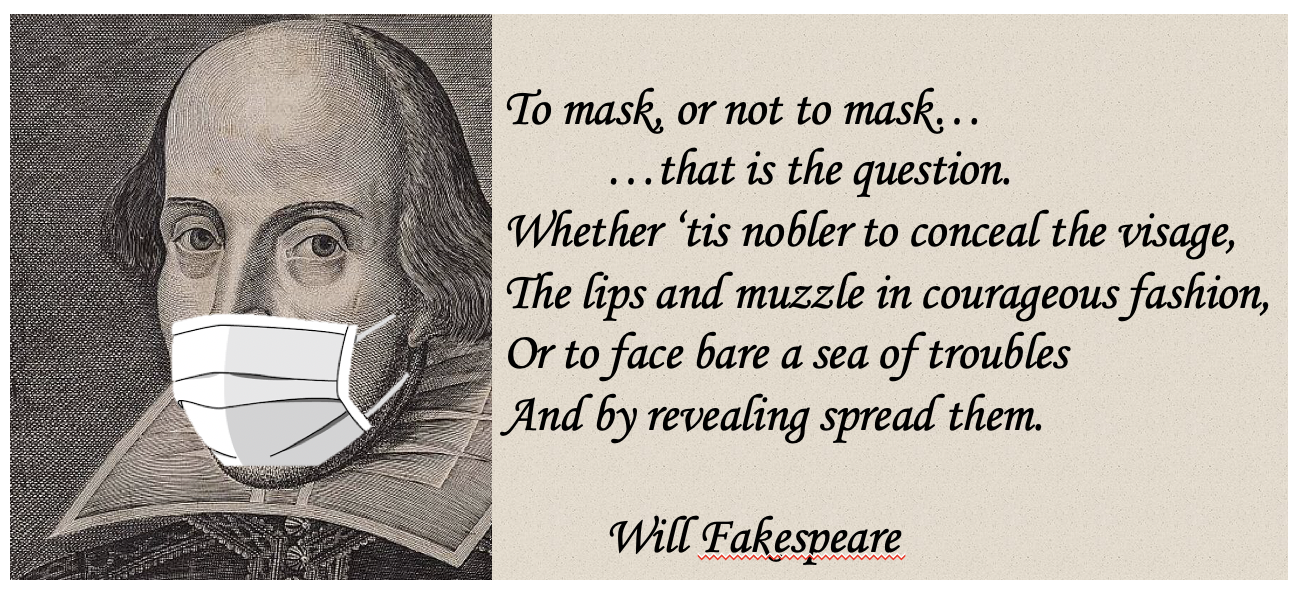The CDC has called for Americans to wear masks. But some people still don’t get it. Donald Trump refused to wear a mask when he visited a mask factory this week. “Live and Let Die” blared in the background.
Mask-wearing is an ethical no-brainer. If masks help us avoid further outbreaks and quarantines, we ought to wear them. Masks also show respect for vulnerable service workers like clerks and cashiers who must daily confront the wheezing masses. And by slowing the contagion we support nurses and doctors overwhelmed by the sick and dying.
A mask is a symbol of solidarity and compassion. It says to other people that you care enough about them to try to prevent them from getting sick. New York governor Andrew Cuomo said, “You know how you show love? By wearing a mask.”
But masks have become a polarizing symbol. According to a recent poll, Democrats are more likely than Republicans to wear them. Those with more education are more likely to wear masks. Black Americans are more likely to wear them than whites.
Skeptics and libertarians have warned that masks are a sign of government overreach and even tyranny. Officials in Oklahoma and Ohio backed away from mandatory masking after public outcry. In Flint, Michigan, a security guard was murdered for trying to enforce a mask requirement.
One Ohio lawmaker, Nino Vitale, went so far as to declare that his Christian faith prohibits him from wearing a mask. He said that God made us in His image and that to cover the face is to obscure the visage of God.
Some backlash is understandable. People don’t like to be told what to do. But most don’t bristle at similar regulations such as “no shirt, no shoes, no service.” When the national anthem plays, people take their hats off. Kids can’t wear racist, gang, or drug-oriented clothes to school.
And of course, public nudity is prohibited. Although even this is contentious. Men go topless. But women may not. Some women have protested against this double-standard.
Perhaps the libertarian backlash against masks should extend to a refusal to wear clothes. One could even imagine a religious point similar to Representative Vitale’s. The entire human body is made in the image of God. Perhaps we should show it all off.
The deep question is what counts as the authentic face or body. People shave, cut their hair, and get their nails done. Which version of your body is the one created in the image of God?
The issue of masking uncovers questions about bodies, identities, and cultural norms. Not too long ago, people freaked out about Muslim women’s veils and headscarves. And masks have been banned in the past, when associated with criminal activity.
The mask controversy exposes the social construction of reality. Veiled women, bandits, and surgeons all cover their faces. But the meaning of the mask depends upon cultural norms and the purpose we have for masking.
It is not easy to draw clear lines here since life involves a whole bunch of masking. We routinely put on masks in order to create or alter our identities. Some, like the President, do it with make-up, a fancy hair-do, and a business suit. Others get plastic surgery. Professionals put on their “game face” at work, along with a uniform. We change our demeanor when we hang out with friends, go to church, or go to a funeral. Life is a complex masquerade.
Existentialist philosophers have often wondered about the reality behind the masks. Does the person remain the same behind the masks and under all of that make-up? Or are we simply the masks we wear and the roles we inhabit?
This brings us back to the current issue. In a pandemic, to wear a mask (or not) is to make a statement about who you are. Whether you wear a mask or go bald-faced you reveal what you value and what you believe.
Some apparently prefer to live and let die. They walk barefaced and proud among the masked masses, believing that liberty trumps public safety. But others emphasize solidarity with those who suffer. They compassionately conceal their faces, so that others may live.


